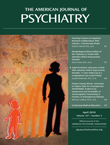Roles of the Akt/GSK-3 and Wnt Signaling Pathways in Schizophrenia and Antipsychotic Drug Action
Abstract
Abstract
Dopamine D2 receptor antagonism is a unifying property of all antipsychotic drugs in clinical use. Remarkably, the effector molecules through which these medications exert their actions remain poorly characterized. Increasing attention is being focused on Akt/glycogen synthase kinase-3 (GSK-3) and wingless (Wnt) signaling pathways, which have been associated with schizophrenia in a number of genetic and postmortem studies. Antipsychotic medications may treat symptoms of psychosis, at least in part, through modulation of levels and activity of Akt, GSK-3, and Wnt-related intracellular signaling. The authors review evidence that Akt/GSK-3 and Wnt-related pathways are involved in the pathogenesis of schizophrenia as well as details of intracellular events related to these molecules mediated by both typical and atypical antipsychotic medications. Further study of Akt/GSK-3 and Wnt signaling may ultimately lead to alternative therapeutics of schizophrenia-related disorders.



